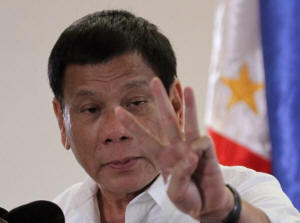|
Philippines' Duterte calls U.S. envoys
'spies' over alleged ouster plot
 Send a link to a friend
Send a link to a friend
 [December 29, 2016]
By Martin Petty and Neil Jerome Morales [December 29, 2016]
By Martin Petty and Neil Jerome Morales
MANILA (Reuters) - Philippine President
Rodrigo Duterte derided U.S. ambassadors as "spies" on Thursday,
responding to a media report of an alleged American plot to destabilize
his government, a job he said some envoys were appointed solely to do.
The volatile former mayor said though had received no intelligence
reports of any U.S. plan to undermine his presidency, he believed most
ambassadors were in cahoots with the Central Intelligence Agency (CIA),
which had a track record of meddling in other countries' affairs.
The Manila Times newspaper on Tuesday reported a former U.S. ambassador
to the Philippines had prepared a "blueprint to undermine Duterte",
citing a document it had received from a what it described as a "highly
placed source". (http://bit.ly/2hhzEGk)
The U.S. State Department has described the allegations as "false".
"Most of the ambassadors of the United States, but not all, are not
really professional ambassadors. At the same time they are spying, they
are connected with the CIA," Duterte said in a television interview.
"The ambassador of a country is the number one spy. But there are
ambassador of the U.S., their forte is really to undermine governments."

Duterte has made no secret of his grudge against the United States and
has a particular disdain for President Barack Obama, who he has told to
"go to hell", mostly over Obama's concern s about Duterte's deadly drugs
war.
He has made repeated threats to abrogate security treaties with the
United States and vented almost daily about U.S. "hypocrisy" and
"bullying".
On Thursday, Duterte said he would honor those treaties and that he
liked U.S. President-elect Donald Trump and was keenly waiting for him
to take office.
The Manila Times said Philip Goldberg, who recently ended his term as
ambassador in Manila, had outlined various strategies over an 18-month
period to destabilize Duterte.
That would include supporting the opposition and co-opting the media,
the military, neighboring countries and senior government officials to
turn against Duterte and isolate him economically.
[to top of second column] |

Philippine President Rodrigo Duterte speaks upon his arrival at
Davao International Airport in Davao city, Philippines, after
returning from an APEC summit meeting in Peru, November 23, 2016.
REUTERS/Lean Daval Jr/File Photo

Duterte has a dislike for Goldberg and has previously called him a
"gay son of a bitch". He referred to him in three successive live
television interviews on Thursday, calling him Washington's
"superstar" with a track record of trying to undermine governments.
Goldberg was expelled as ambassador to Bolivia in 2008 by then
President Evo Morales, who accused him of siding with his rightist
opponents and of orchestrating street protests.
The United States rejected that and said his expulsion was a "grave
error".
"Maybe he will deny it but it's not good," Duterte said of
Goldberg's alleged blueprint, which he said was plausible because of
Goldberg's history.
He added: "You might be able to oust me, but I will give you a
bloody nose."
Attempts by Reuters to reach Goldberg this week were unsuccessful.
U.S. Assistant Secretary of State for East Asia and the Pacific
Daniel Russel dismissed the Manila Times report.
"No such blueprint exists," he said in a statement on Tuesday.
"The United States respects the sovereignty of the Philippines and
the democratic choices made by the Philippine people."
(Editing by Robert Birsel)
[© 2016 Thomson Reuters. All rights
reserved.]
Copyright 2016 Reuters. All rights reserved. This material may not be published,
broadcast, rewritten or redistributed.
 |